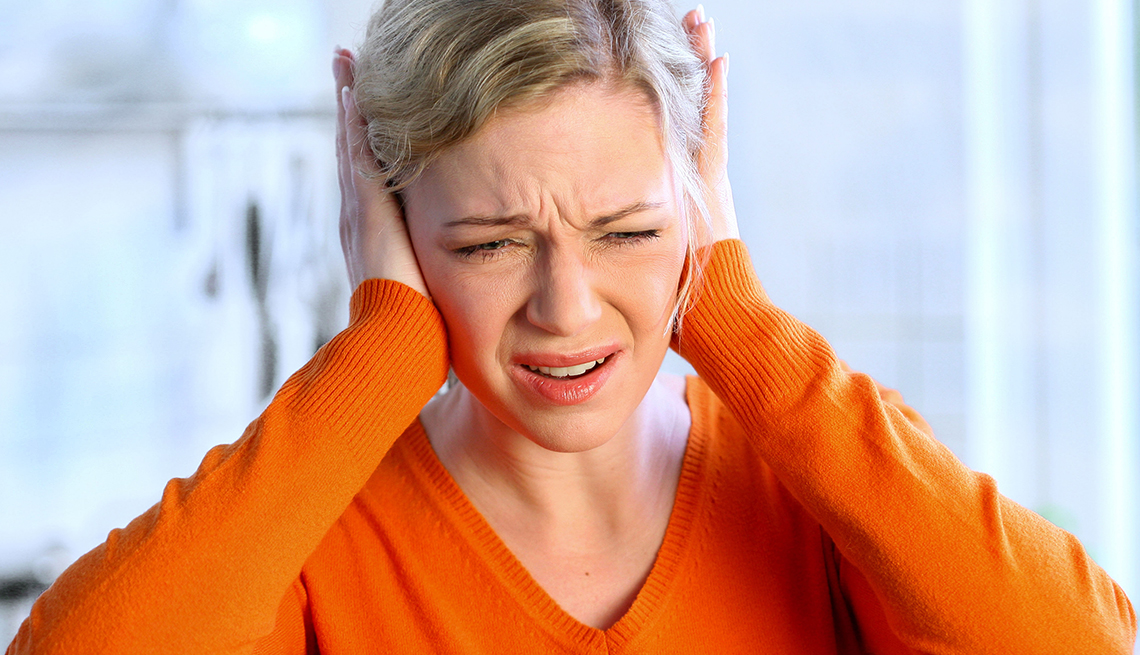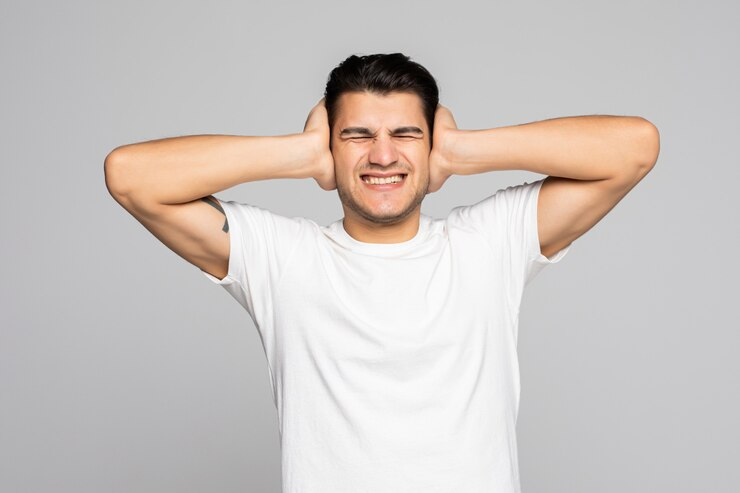
Our Blog
Why Tinnitus Can Get Worse
Tinnitus, the constant perception of ringing or buzzing in one ear or both, should not be taken lightly. Experts found tinnitus getting worse is a sign of an underlying condition. If not treated properly, tinnitus may lead to more severe hearing issues.
While some people experience it mildly and rarely, 1.6 million Canadians reported severe tinnitus, impacting their everyday lives. Patients will likely try just about anything to make the noise go away.

Prompt tinnitus clinic Toronto consultation can help reduce the noise you hear in the absence of external sounds. Conversely, delaying treatment can make tinnitus worse. Early diagnosis helps rule out other factors causing tinnitus, narrowing down to more targeted treatment options.
In this article, we’ll explore what factors can aggravate tinnitus and ways to manage it. We’ll also discover proper treatments recommended by a professional audiologist in Toronto.
What Makes Tinnitus Worse?
Causes of tinnitus vary on individual experiences. It is closely linked to many underlying health issues, including age-related hearing loss and inner ear damage.
Some feel less bothered by tinnitus when in quiet spaces, while some report amplified symptoms.
One common factor that worsens tinnitus symptoms is when the ears block sounds, hindering normal hearing. This increases sensitivity to internal noises or somatic sounds, making the tinnitus seem louder and more persistent.
A lot of other factors make tinnitus worse. Below are the most common ones.
Loud Noises
Continuous exposure to loud sounds is a well-known trigger for making tinnitus worse. This can be anything from attending loud concerts to working in noisy environments.
Loud noises can result in short-term to permanent hearing loss. It can also trigger other communication disorders, such as:
Severe tinnitus making it harder to focus on conversations
Increased cognitive load making it more challenging to process and respond to verbal communication effectively
Stressed emotional responses making individuals less patient and more withdrawn
Ear Wax Buildup
When earwax accumulates excessively, it blocks the ear canal, increasing pressure and reducing sound transmission. This blockage worsens the perception of ringing sounds and irritates the ear canal.
This can lead to other possible causes of temporary tinnitus like ear infections, sinus infections, and thyroid abnormalities.
For those experiencing tinnitus related to earwax buildup, professional ear cleaning provides significant benefits. Chinese Ear Cleaning Toronto offers specialized techniques to safely and effectively remove excess earwax, providing relief from tinnitus symptoms and improving overall ear health.
Skilled practitioners perform this traditional method, clearing the ear canal and promoting a sense of relaxation. You may want to ask them “How long does tinnitus last after ear wax cleaning?”
Stress and Anxiety
The relationship between stress and tinnitus is a two-way street. Stress can worsen tinnitus perception, and chronic tinnitus itself can be a significant source of anxiety and depression. These make the tinnitus noise seem louder.
Deep breathing, exercises, and massage therapy or acupuncture can help relieve stress levels and anxiety.
Sleep Deprivation
Not getting enough quality sleep can make tinnitus seem louder and more noticeable. Insomnia, a common symptom of anxiety and stress, exacerbates this issue.
When individuals are unable to obtain sufficient restorative sleep, their ability to cope with tinnitus-related distress diminishes. The lack of sleep amplifies sensitivity to the perceived sound of tinnitus, making it more prominent and intrusive.
Additionally, the fatigue and irritability resulting from inadequate sleep further compound the emotional toll of living with chronic tinnitus. This creates a challenging cycle of sleep disturbance and heightened distress.
Studies found that targeted treatment and therapy help prevent the worsening of insomnia and tinnitus.
Medications
Certain medications, particularly high doses of nonsteroidal anti-inflammatory drugs (NSAIDs) and some antibiotics, can worsen tinnitus in some individuals. These medications also include:
Antidepressants
Cancer drugs
Diuretics
Aspirin
In most cases, the higher the dose, the greater the risks. Always consult your professional healthcare provider in your decision-making. A doctor may advise whether to keep, moderate, or discontinue medicine use.
Smoking
The chemicals in cigarettes restrict blood flow, potentially damaging delicate structures in the inner ear. This can lead to hearing loss and worsen existing tinnitus symptoms.
Additionally, smoking is associated with increased oxidative stress and inflammation, both of which can further damage the auditory system. Quitting smoking significantly helps tinnitus and preserves auditory function.
Alcohol
While a relaxing drink might seem appealing, alcohol can act as a diuretic, dehydrating the body. Dehydration can affect the fluid balance in the inner ear, leading to pressure changes and making tinnitus perception worse.
Furthermore, alcohol can interfere with the central nervous system, including the auditory pathways, amplifying the perception of ringing sounds. Therefore, limiting alcohol consumption or avoiding it altogether can make a difference in tinnitus management.
Allergies
Seasonal allergies can cause inflammation in the Eustachian tubes, which connect the middle ear to the back of the nose and throat. This inflammation can disrupt the normal flow of air and fluid.
Allergic reactions also trigger histamine release, which may further contribute to the discomfort in the ear. Managing allergies through medication or allergen avoidance strategies can reduce the negative impact on tinnitus.
Migraines
Migraines can sometimes cause a specific type of tinnitus called pulsatile tinnitus, where the ringing seems to pulse in rhythm with your heartbeat. This phenomenon may occur due to changes in blood flow and pressure within the blood vessels surrounding the inner ear.
During a migraine attack, blood vessels can dilate and constrict rapidly, leading to fluctuations in blood flow. This can further lead to sensory disturbances such as sensitivity to light and sound, and heightening awareness of tinnitus symptoms.
Jaw Problems
Issues with the jaw joint, like temporomandibular joint disorder (TMJ), can sometimes be linked to tinnitus symptoms. Misalignment or excessive tension in the jaw muscles can change the blood pressure and flow within the ear, contributing to the perception of tinnitus.
Additionally, the close proximity of the jaw joint to the auditory system means that any disturbances in jaw movement or function can potentially affect the delicate structures involved in hearing.
Infections
Ear infections can irritate the inner ear and worsen tinnitus. They cause inflammation and fluid buildup, leading to increased pressure and perception. Infections also trigger immune responses, making tinnitus more noticeable and bothersome.
Blood Pressure
Both high blood pressure and sudden changes in blood pressure can worsen tinnitus for some people. Disrupted blood flow amplifies the tinnitus symptoms. Similarly, sudden fluctuations in blood pressure, such as those experienced during moments of stress or physical exertion, can also affect the delicate structures of the inner ears.
Caffeine
While not a direct cause, excessive caffeine intake can worsen anxiety symptoms, which can in turn make tinnitus seem louder.
What makes tinnitus better?
There is no one-size-fits-all cure for chronic tinnitus, but several strategies help manage its impact on your daily life.
Tinnitus Retraining Therapy (TRT)
Tinnitus Retraining Therapy (TRT) includes individual counseling on tinnitus development and how therapy helps manage symptoms. This counseling component aims to educate individuals about the mechanisms underlying tinnitus and the psychological factors that can influence its perception. By understanding its nature and learning coping strategies, individuals can develop a more positive attitude towards their condition and reduce emotional distress.
Sound Therapy
Sound therapy helps habituate the brain to tinnitus by introducing external sounds, masking the ringing perception. Using a white noise machine or app with calming soundscapes can mask tinnitus and provide a soothing environment for sleep.
This method may also involve placing a device within the ear to produce low-level white noise or environmental sounds that correspond to the pitch and volume of the tinnitus. You can undergo sound therapy for one to two years depending on the severity.
Hearing Aids
Hearing aids can amplify external sounds, making tinnitus less evident, especially if you have hearing loss alongside it. This auditory stimulation can shift your focus away from the perception, thereby reducing its prominence in your awareness.
Stress Management Techniques
Techniques like relaxation therapy, meditation, and cognitive-behavioral therapy can help reduce stress and anxiety, and ultimately lessen the perception of tinnitus.
Getting Enough Sleep
Aim for 7-8 hours of quality sleep each night. A good sleep hygiene routine can improve sleep quality and potentially reduce the impact of tinnitus at night.
Maintaining a Healthy Lifestyle
A healthy lifestyle that includes a balanced diet, regular exercise, and limited alcohol and caffeine intake can promote overall well-being and potentially reduce tinnitus severity.
Masking
Masking devices work like hearing aids by producing low-level sounds that help mask or cover up the perceived tinnitus noise.
Conclusion
A detailed medical history and check-up can find the cause and suggest treatments for tinnitus. Though knowing about it is helpful, it’s best to get advice from a professional, especially when you feel the tinnitus getting worse.
The American Tinnitus Association is a valuable resource for additional information and support groups for those living with tinnitus. Know that you’re not alone, and there are strategies to manage tinnitus and improve your quality of life.
